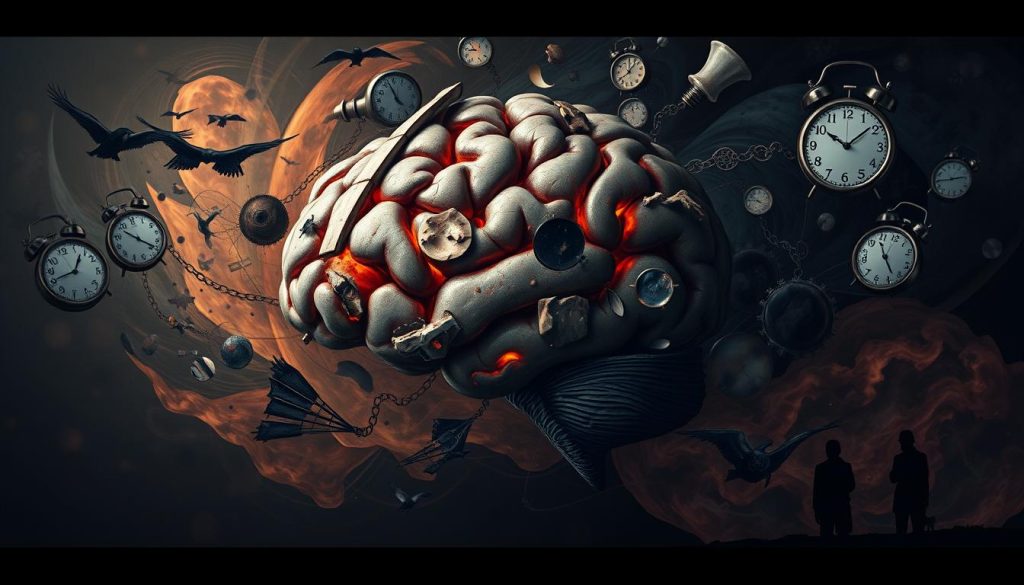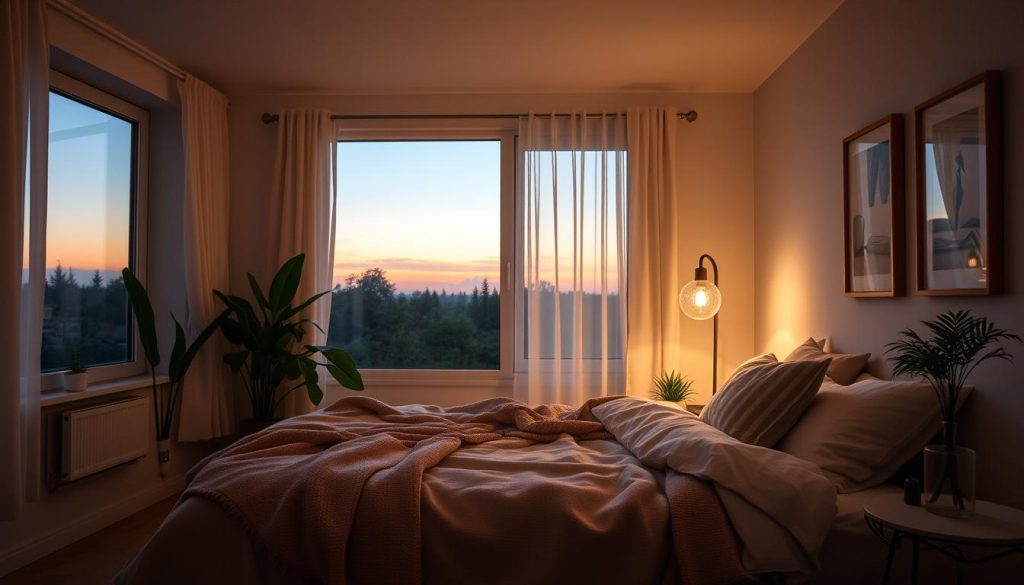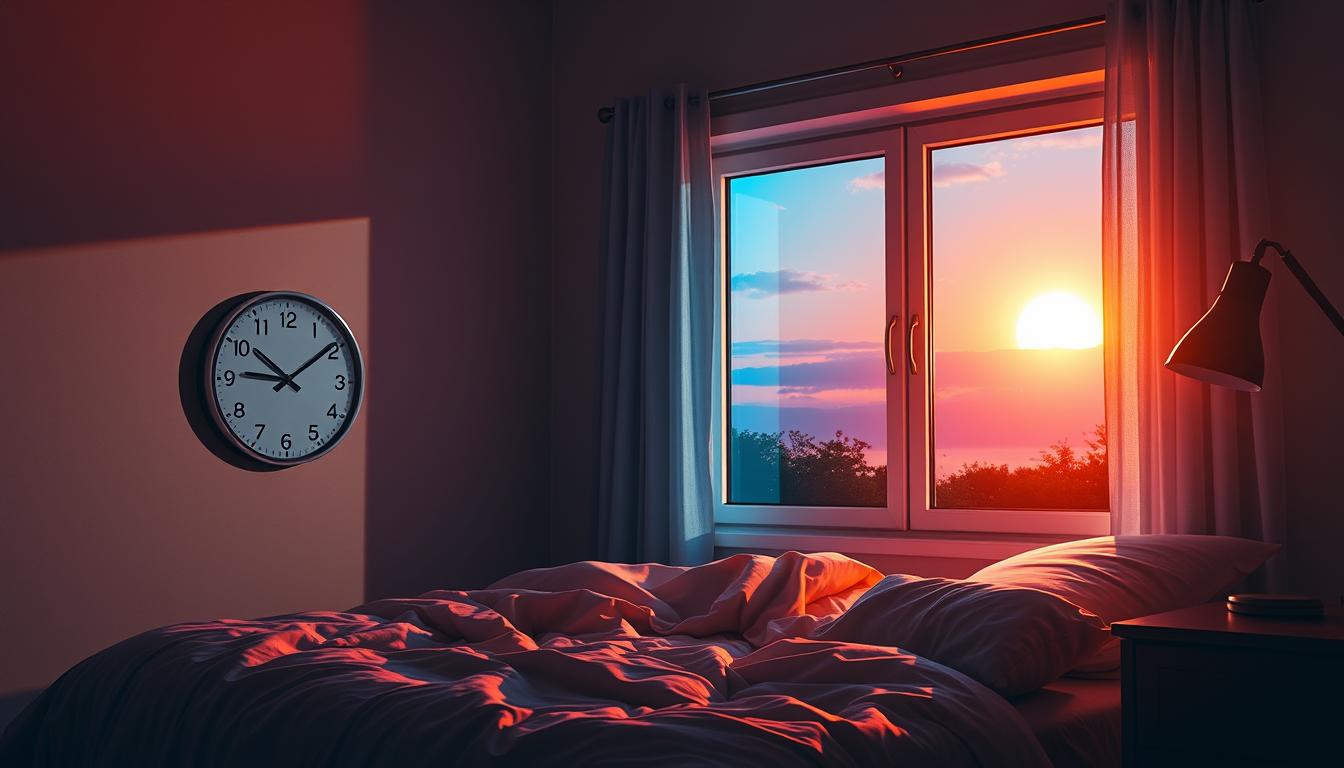Have you ever thought about how light and dark patterns affect your sleep? Knowing how circadian rhythm and sleep deprivation work together is key to better sleep. Studies from the National Sleep Foundation show a strong link between these two. Many of us don’t know how to improve our sleep because of wrong beliefs.
By learning about our circadian rhythm, we can change our lives for the better. It’s time to discover how controlling our internal clock can improve our sleep and daily life.
Understanding Circadian Rhythm
The circadian rhythm is my body’s natural 24-hour cycle for sleeping and waking. It’s linked to my biological clock. It affects hormone release, eating, and body temperature. The National Institute of Health says natural light and darkness shape my sleep-wake cycles.
By following consistent routines, I can better regulate my sleep and overall health.
What is Circadian Rhythm?
Circadian rhythm is key to my body’s functions, including sleep and daily activities. It helps me sleep at night and wake in the morning. My biological clock uses light cues to work best.
Melatonin, a hormone, signals when it’s time to rest. Knowing about this rhythm shows how important it is for health.
How Circadian Rhythm Regulates Sleep
This rhythm controls sleep by affecting melatonin production. As night falls, my body makes more melatonin, making me sleepy. Disruptions can lead to insomnia or daytime sleepiness.
Studies show regular sleep schedules improve sleep quality. This shows how daily habits affect night rest.
Factors Influencing My Circadian Rhythm
Many things can change my circadian rhythm and sleep quality. These include:
- Exposure to natural light during the day, which helps regulate my internal clock
- Diet and food intake, where certain foods can either promote or hinder sleep
- Physical activity levels, where regular exercise fosters a smoother sleep-wake cycle
- Stress management, as high stress can disrupt my biological clock
By understanding these factors and adjusting my lifestyle, I can improve my sleep environment.

The Science Behind Sleep Deprivation
Sleep deprivation affects both physical and mental health deeply. Knowing how my body reacts to not enough sleep shows why sleep is key. It harms my thinking, mood, and health. Experts say it can cause serious problems like obesity, diabetes, and heart disease.
What Happens to My Body During Sleep Deprivation?
When I don’t sleep enough, my body changes in bad ways. My energy drops, and I get tired easily. My body also makes less of certain hormones, which can make me gain weight.
This imbalance hurts my cells, causing inflammation and weakening my immune system. It shows how sleep affects my physical health.
Common Symptoms of Sleep Deprivation
Knowing the signs of sleep deprivation is important. Some common ones are:
- Excessive daytime sleepiness
- Decreased performance in daily tasks
- Irritability and mood swings
- Difficulty concentrating and cognitive impairment
These signs affect my daily life and relationships. Not getting enough sleep messes with my body’s natural rhythm. It shows how sleep is linked to my overall health. 
Circadian Rhythm and Sleep Deprivation
Sleep deprivation has many bad effects on my body’s natural rhythm. It doesn’t just make me tired. It also messes with my body’s internal clock, making it hard to sleep and wake up at the right times. Studies show that not getting enough sleep can mess up this rhythm, making it tough to keep a regular sleep schedule.
How Sleep Deprivation Disrupts My Circadian Rhythm
Every time I don’t get enough sleep, my daily life changes. My energy and mood shift. This messes up my body’s rhythm, making it harder to fall asleep and stay asleep. Without enough sleep, my body can’t make melatonin, the hormone that helps us sleep, at the right times. This makes it hard to relax when I should be sleeping.
The Long-Term Effects of Disrupted Sleep
Chronic sleep loss has serious health effects, as I’ve seen firsthand. It can lead to anxiety, mood swings, and a weaker immune system. Experts warn that disrupted sleep can increase the risk of chronic diseases. This shows how crucial it is to get enough sleep to stay healthy.
| Health Consequences | Examples |
|---|---|
| Anxiety and Depression | Increased stress levels, mood swings |
| Weakened Immune System | Greater susceptibility to infections |
| Chronic Diseases | Heart disease, diabetes |
| Cognitive Decline | Memory issues, difficulty concentrating |
Strategies to Improve My Sleep Quality
Creating a sleep-friendly atmosphere is key to better sleep. Changing my bedroom can help me sleep deeper and more restfully. It’s important to find ways to improve both my sleep space and habits.
Creating a Sleep-Friendly Environment
Improving my sleep environment involves several important steps:
- Noise: Using earplugs or a white noise machine can help mask disruptive sounds.
- Temperature: Keeping the room cool, between 60-67°F, helps me sleep better.
- Darkness: Blackout curtains or eye masks block out light, promoting better sleep quality.
The American Academy of Sleep Medicine stresses the importance of these factors. A well-designed bedroom setup helps me relax and prepare for sleep.
Establishing a Consistent Sleep Schedule
Having a regular sleep routine is crucial for my circadian rhythm. Going to bed and waking up at the same time each day helps my body’s natural sleep-wake cycle. Research shows that regularity improves sleep quality, health, and productivity.
I make sure to set a bedtime that allows for enough rest. This ensures I get the deep, restorative sleep I need.
Mindfulness and Relaxation Techniques
Using mindfulness for sleep through relaxation techniques can greatly reduce stress and prepare my mind for rest. Some effective strategies I can adopt include:
- Meditation: Mindfulness meditation helps center my thoughts before sleep.
- Deep Breathing: Deep breathing exercises lower anxiety and calm my mind.
- Progressive Muscle Relaxation: This technique involves tensing and relaxing muscle groups, promoting physical relaxation.
Scientific studies show that these practices lead to a more peaceful sleep experience. They support the need for stress reduction and overall well-being.

| Sleep Environment Factor | Tip for Improvement | Impact on Sleep |
|---|---|---|
| Noise | Use earplugs or a white noise machine | Promotes uninterrupted sleep |
| Temperature | Keep the room between 60-67°F | Facilitates falling asleep faster |
| Darkness | Employ blackout curtains or an eye mask | Enhances melatonin production |
The Role of Light in Regulating Sleep
Light is key to my sleep and health. Knowing how natural and artificial light affects me helps me sleep better. By getting more daylight and controlling artificial light, I can sleep well and feel alert.
The Impact of Natural Light on Circadian Rhythm
Being outside in the day affects my body’s rhythm. Morning sunlight boosts serotonin, making me feel awake and good. Studies show it also helps make melatonin, which is crucial for sleep.
Even small amounts of natural light, like working in a bright room, can improve sleep. It’s all about how much light I get.
How to Use Artificial Light to My Advantage
Artificial light is important too. But, blue light from screens can mess with my sleep. To fight this, I can:
- Turn off screens an hour before bed.
- Wear blue light blocking glasses in the evening.
- Use apps that change screen brightness and color as the day goes on.
Light therapy is also helpful. It uses special lamps to mimic natural light. This helps my body adjust to a better sleep-wake cycle, especially for those with sleep disorders.
| Light Type | Effects on Sleep | Recommendations |
|---|---|---|
| Natural Light | Enhances alertness, promotes melatonin production | Spend 20-30 minutes outdoors each day |
| Artificial Light (Blue Light) | Disrupts sleep, delays melatonin secretion | Avoid screens 1 hour before bed; use blue light filters |
| Light Therapy | Helps regulate sleep cycles, improves mood | Use for 20-30 minutes upon waking during dark months |
Nutrition’s Impact on Sleep
Nutrition is key to good sleep. I can tweak my diet to sleep better. Some foods help me sleep, while others can keep me awake. Knowing this helps me choose wisely.
Foods that Promote Better Sleep
Adding sleep-promoting foods to my diet helps a lot. Here are some great options for a better night’s sleep:
- Almonds: Rich in magnesium, which is known to improve sleep quality.
- Turkey: Contains tryptophan, an amino acid that helps increase melatonin production.
- Kiwi: High in antioxidants and serotonin, both of which support better sleep.
- Fatty Fish: Packed with omega-3 fatty acids and vitamin D, may offer beneficial effects on sleep.
- Oatmeal: A comforting food that promotes the production of sleep-inducing hormones.
Foods and Drinks to Avoid Before Bedtime
It’s important to know which foods can mess with my sleep. Some items should be avoided close to bedtime to avoid sleep issues:
- Caffeine: This stimulant is found in coffee, tea, and chocolate, and can keep me awake for hours.
- Alcohol: While it may make me sleepy initially, it often disrupts sleep patterns later in the night.
- Heavy Meals: Consuming large quantities can lead to discomfort, making it hard to fall asleep.
- Spicy Foods: These can cause indigestion, keeping me alert and uncomfortable while trying to rest.
When to Seek Professional Help for Sleep Issues
If I’m having trouble sleeping, like insomnia or snoring, it’s time to get help. These problems might show there’s a bigger issue with my sleep. I might think it’s just stress or being busy, but it’s important to see a sleep specialist.
Seeing a sleep expert can help me understand my sleep better. Places like the American Academy of Sleep Medicine offer great advice. They can help me find the right treatment for my sleep problems.
Ignoring sleep issues can really affect my life. It can make me feel tired and change my mood. Getting help can improve my sleep and make me feel better overall. Knowing when to ask for help is key to better sleep and health.

